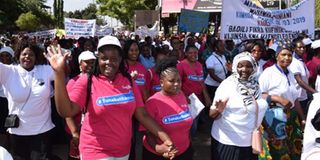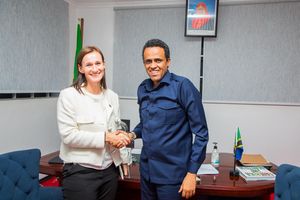OPINION: Let ‘womenomics’ spur growth

Last week (on March 8) the world celebrated the International Women’s Day (IWD), reflecting on how far we have gone to address a number of challenges that women are still facing in the workplace. If you thought that was it until next year, then think again! IWD is not a one-day event.
Instead advocacy of women empowerment ought to be a continuous process.
This year’s theme advocates a gender balanced world and inclusion of women in myriad ways.
Gender parity in real terms cannot be achieved overnight. Nevertheless some organisations have demonstrated to be gender inclusive by supporting and implementing various initiatives to inspire women’s development and improve gender balance.
‘Womenomics’ is a term that some have used to convey the idea, closely associated with Japanese Prime Minister Shinzo Abe, that the advancement of women and economic development are necessarily linked. This empowerment is key to the prosperity or poverty alleviation agenda.
Even though we need to appreciate the progress women have made so far globally and in Tanzania in particular, there is still much more opportunity for Tanzanian organisations to enhance effective participation of women in the economy.
Feedback from various women that I have interacted with during my career is that whilst they acknowledge the programmes that many organisations or societies have embarked on, they at the same time emphasise the importance of being able to demonstrate how women are truly empowered and supported through them.
In other words, it is not just about the policies and programmes, but rather the implementation, sustainability and accountability of these programmes to accelerate their empowerment.
According to the Global Gender Gap report released in 2018 by the World Economic Forum, the overall global gender gap will only close in 108 years across the 106 countries covered since the first edition of the report! The most challenging gender gaps to close are the economic and political empowerment dimensions, which will take 202 and 107 years to close, respectively.
Although the economic opportunity gap has slightly reduced this year, progress has been slow, especially in terms of participation of women in labour force, where the gender gap slightly reversed. Looking at these statistics, it is clear that whilst progress has been made, there is still a long way to go.
But significant progress can be made, as highlighted in a recent PwC report (PwC Women in Work Index: Closing the Gender Pay Gap) which identifies The Nordic countries (in particular, Iceland, Sweden and Norway) as being top performers in reducing gender disparity.
What to do? Well from my experience at PwC Tanzania there are a number of initiatives that we have undertaken, led by our “Women in PwC” programme, which may be of interest including: mentoring women to assist them in their career development; a support programme for working mothers with an objective of connecting new mothers with existing mothers who have experience in juggling motherhood and a career at the Firm; a wellness programme that incorporates various aspects of health, lifestyle and life skills; a dedicated mother’s room where mothers can express and store milk; a flexible working policy, which provides various options for all staff to be able to better achieve balance between work and personal commitments.
Organisations in Tanzania should seek or continue to embrace Diversity and Inclusion (D&I) in everyone’s DNA in the organisation from top management to the junior staff.
D&I should not only be viewed as management’s issue but rather an issue for everyone to act upon and be mindful of their own unconscious biases or blind spots when interacting and dealing with one another.
As a human resource professional, I would advise my peers to be at the forefront of ensuring that organisations are gender inclusive in recruitment, performance evaluations, provision of learning and development programmes, in talent identification and also when dealing with compensation & rewards (just to mention a few).
My call to all women is we need to articulate what we want, be confident in our abilities and commit towards our own development in order to be able to rise and take up the opportunities that organisations make available for us.




